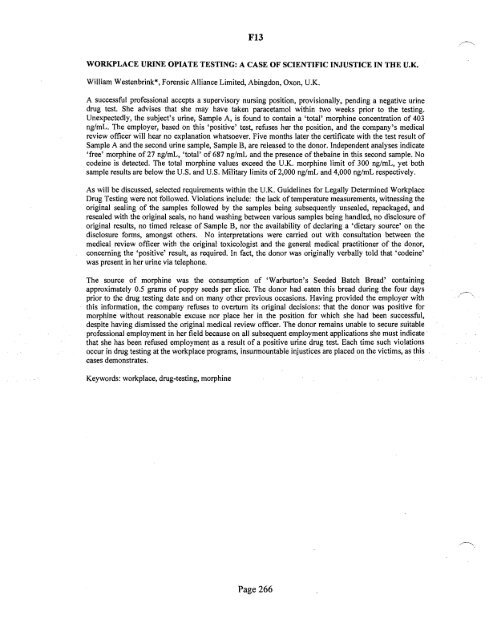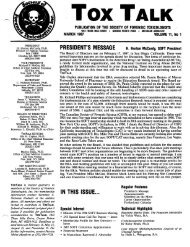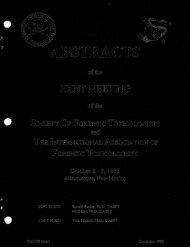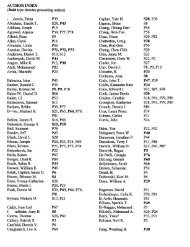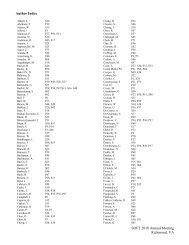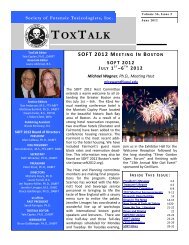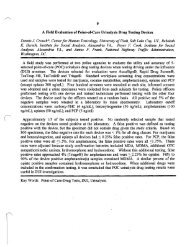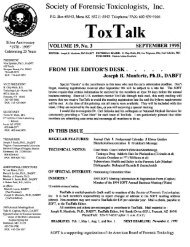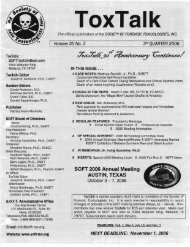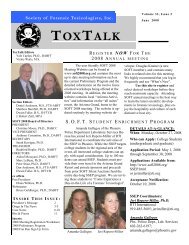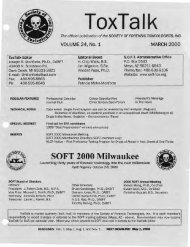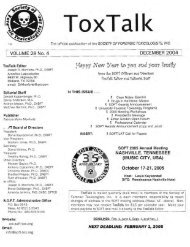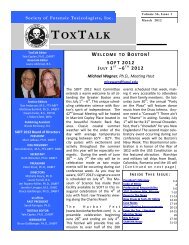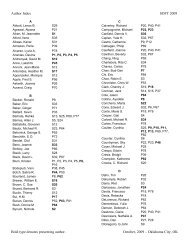SOFT 2004 Meeting Abstracts - Society of Forensic Toxicologists
SOFT 2004 Meeting Abstracts - Society of Forensic Toxicologists
SOFT 2004 Meeting Abstracts - Society of Forensic Toxicologists
You also want an ePaper? Increase the reach of your titles
YUMPU automatically turns print PDFs into web optimized ePapers that Google loves.
F13 <br />
WORKPLACE URINE OPIATE TESTING: A CASE OF SCIENTIFIC INJUSTICE IN THE U.K.<br />
William Westenbrink*, <strong>Forensic</strong> Alliance Limited, Abingdon, Oxon, U.K.<br />
A successful pr<strong>of</strong>essional accepts a supervisory nursing position, provisionally, pending a negative urine<br />
drug test. She advises that she may have taken paracetamol within two weeks prior to the testing.<br />
Unexpectedly, the subject's urine, Sample A, is found to contain a 'total' morphine concentration <strong>of</strong> 403<br />
ngimL. The employer, based on this 'positive' test, refuses her the position, and the company's medical<br />
review <strong>of</strong>ficer will hear no explanation whatsoever. Five months later the certificate with the test result <strong>of</strong><br />
Sample A and the second urine sample, Sample B, are released to the donor. Independent analyses indicate<br />
'free' morphine <strong>of</strong> 27 nglmL, 'total' <strong>of</strong> 687 ng/mL and the presence <strong>of</strong> thebaine in this second sample. No<br />
codeine is detected. The total morphine values exceed the U.K. morphine limit <strong>of</strong> 300 ng/mL, yet both<br />
sample results are below the U.S. and U.S. Military limits <strong>of</strong> 2,000 ng/mL and 4,000 ng/mL respectively.<br />
As will be discussed, selected requirements within the U.K. Guidelines for Legally Determined Workplace<br />
Drug Testing were not followed. Violations include: the lack <strong>of</strong>temperature measurements, witnessing the<br />
original sealing <strong>of</strong> the samples followed by the samples being subsequently unsealed, repackaged, and<br />
resealed with the original seals, no hand washing between various samples being handled, no disclosure <strong>of</strong><br />
original results, no timed release <strong>of</strong> Sample B, nor the availability <strong>of</strong> declaring a 'dietary source' on the<br />
disclosure forms, amongst others. No interpretations were carried out with consultation between the<br />
medical review <strong>of</strong>ficer with the original toxicologist and the general medical practitioner <strong>of</strong> the donor,<br />
concerning the 'positive' result, as required. In fact, the donor was originally verbally told that 'codeine'<br />
was present in her urine via telephone.<br />
The source <strong>of</strong> morphine was the consumption <strong>of</strong> 'Warburton's Seeded Batch Bread' containing<br />
approximately 0.5 grams <strong>of</strong> poppy seeds per slice. The donor had eaten this bread during the four days<br />
prior to the drug testing date and on many other previous occasions. Having provided the employer with<br />
this information, the company refuses to overturn its original decisions: that the donor was positive for<br />
morphine without reasonable excuse nor place her in the position for which she had been successful,<br />
despite having dismissed the original medical review <strong>of</strong>ficer. The donor remains unable to secure suitable<br />
pr<strong>of</strong>essional employment in her field because on all subsequent employment applications she must indicate<br />
that she has been refused employment as a result <strong>of</strong> a positive urine drug test. Each time such violations<br />
occur in drug testing at the workplace programs, insurmountable injustices are placed on the victims, as this<br />
cases demonstrates.<br />
Keywords: workplace, drug-testing, morphine<br />
Page 266


